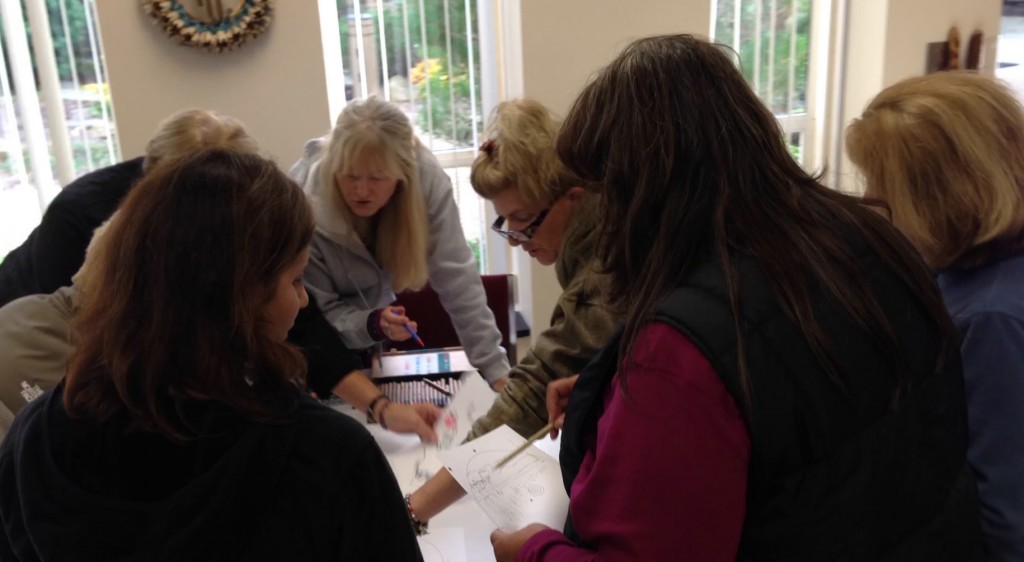 At our resent Shift Gathering Retreat, Del had the members of the group sit outside for about fifty minutes every day. Their task was to be still in nature, and to note what they saw, felt, smelled, and touched. In addition, they were to notice where they were sitting within the bigger landscape.
At our resent Shift Gathering Retreat, Del had the members of the group sit outside for about fifty minutes every day. Their task was to be still in nature, and to note what they saw, felt, smelled, and touched. In addition, they were to notice where they were sitting within the bigger landscape.
Each person chose a different spot to sit, but the idea was to remain aware of everyone, even if they couldn’t see where they were.
When they returned from their sit, they did a small sketch of where they were in the landscape. Then, as a team, they were to draw a map of the landscape on a large sheet of paper. They had to mark where they had been sitting, and agree where every other member of the group had been sitting too.
It was immediately clear that depending on where they had been sitting, what they saw was completely different from what others had seen, sitting somewhere else.
Each of them had a different perception of the exact same landscape.
At first, the fact that they all had a different perception caused a problem. They couldn’t agree on what the landscape looked like. There were different reactions to the problem; some walked away, and others couldn’t find the right words to explain what they meant. However, because they wanted to reach agreement, each day it got easier to see the other person’s perception, and to work together in collaboration.
As collaboration became the intent, the landscape began to fill in. On the last day, everyone was satisfied that their point of view had been heard, and their perception taken into consideration, and a fully sketched out version of the landscape emerged.
I am sure you see the correlation between this practice and everyday life.
In life, we all “sit” somewhere different from everyone else. Even if we grow up in the same family, we experienced the landscape differently.
We have all heard that eyewitnesses are never reliable. Their state of mind, where they were standing, what they were thinking, their background, their prejudices, all produce a different version of the same event.
However, in spite of all this, we must communicate with each other, and live together in harmony. How do we do that when it appears that we all see, feel, taste, touch, the same thing differently? Once again, it begins from intent.
The intent at The Gathering was collaboration, cooperation, understanding, and a desire to work together in love and harmony. That meant there were layers upon layers of talking. It meant clear communication was necessary in order to be heard and understood. It also meant listening without preconceived ideas about what others were saying.
As Del and I observed them on the first day, we whispered to each other, “Good thing they aren’t trying to put a man on the moon.” It took practice, but by the last day, they were working as a team; talking, laughing, comparing, listening, looking, showing, demonstrating, all at one time, and yet it worked.
Hard to do? Yes. Possible? Absolutely! Worth it? Yes! The result of the collaboration was bigger than anything that could have been done alone.
We can’t expect anyone to see things exactly the way we see the same thing.
However, instead of this difference of perception being a barrier, it is a blessing when we accept that it is only together that we can see the whole picture. The person touching the elephant’s ear needs to listen to those at its feet, head, body, tail, toes, etc. to know what an elephant looks like.
Only together, although standing in different perceptions, can we expand into an increased understanding and awareness of the universe and the Intelligence that is its essence.
Without this intent of mutual respect, and collaboration we are doomed. We will stand in our individual points of view and struggle to make things happen, or worse, fight with each other.
In every conversation lies the possibility of dissent or expansion. It’s our choice, and the outcome will always be a result of that choice.
There is one more thing to know, and it is important.
When we are the one who is the most aware in a situation or conversation, we must lead the way. We have to forget about trying to be right. We have to overcome the urge to wanting our way to be the way.
Instead, we must yearn to understand first. When we do this, others can feel heard, and in turn, they are more likely to listen to us. In the end, choosing collaboration, compassion, and community, we will all thrive, and feel understood.
The outcome of this shared perception will be better than we can ever expect on our own, and everyone, no matter what their perception of the landscape is, can live in peace.

 BECA LEWIS coaches, teaches, writes blogs and books, plays with art, and is addicted to reading. She lives in Ohio with her husband and has kids and grandkids scattered across the country.
BECA LEWIS coaches, teaches, writes blogs and books, plays with art, and is addicted to reading. She lives in Ohio with her husband and has kids and grandkids scattered across the country.






